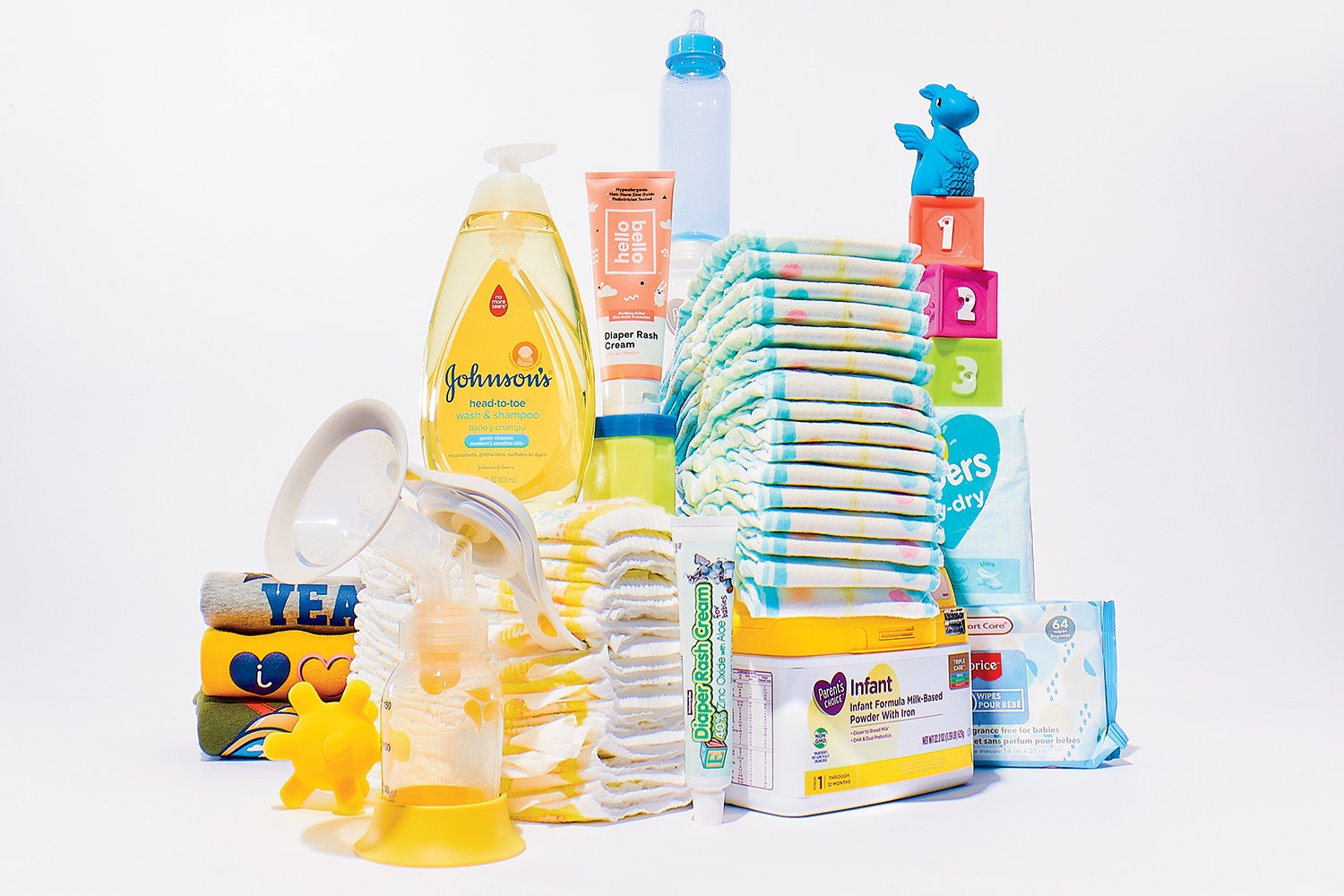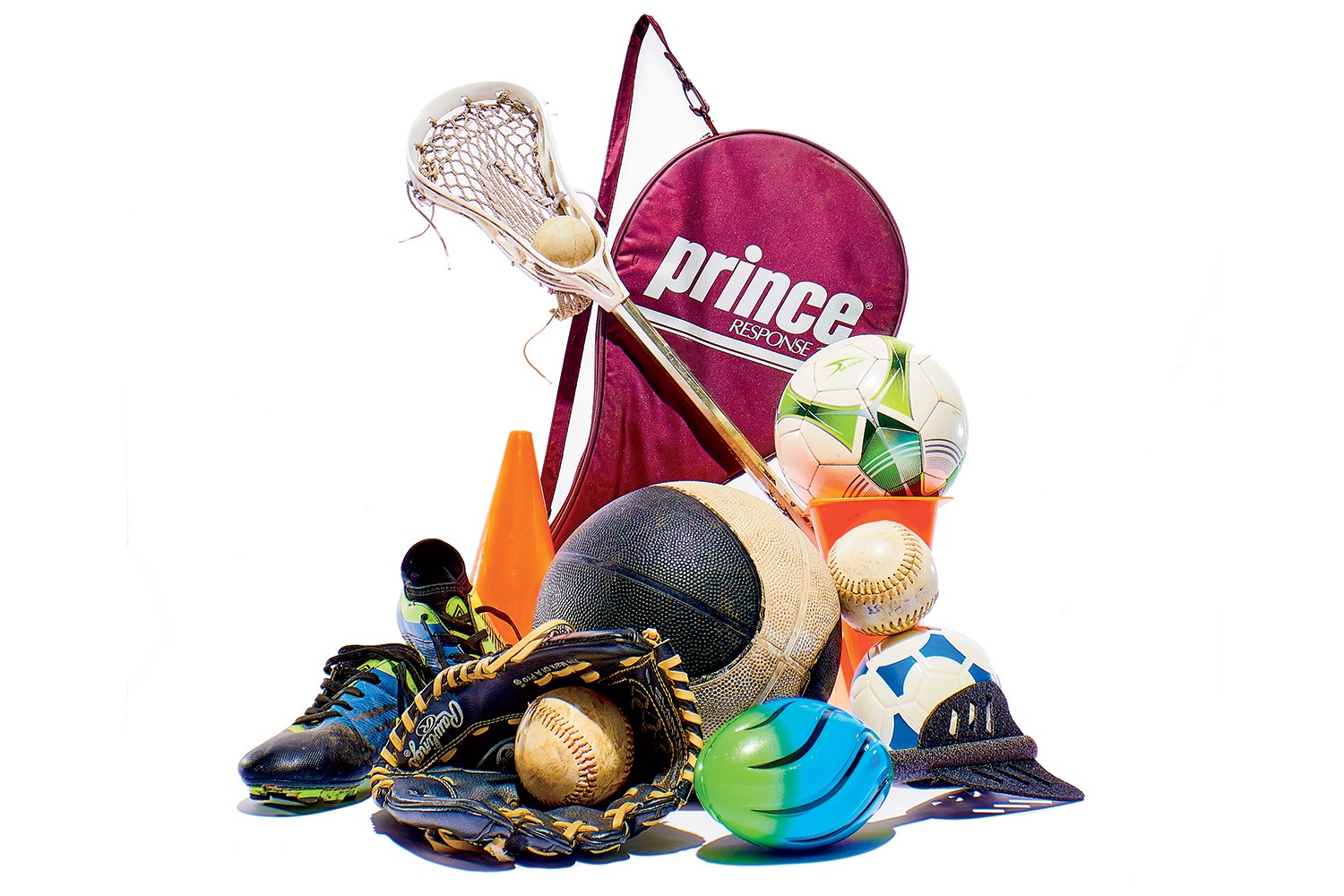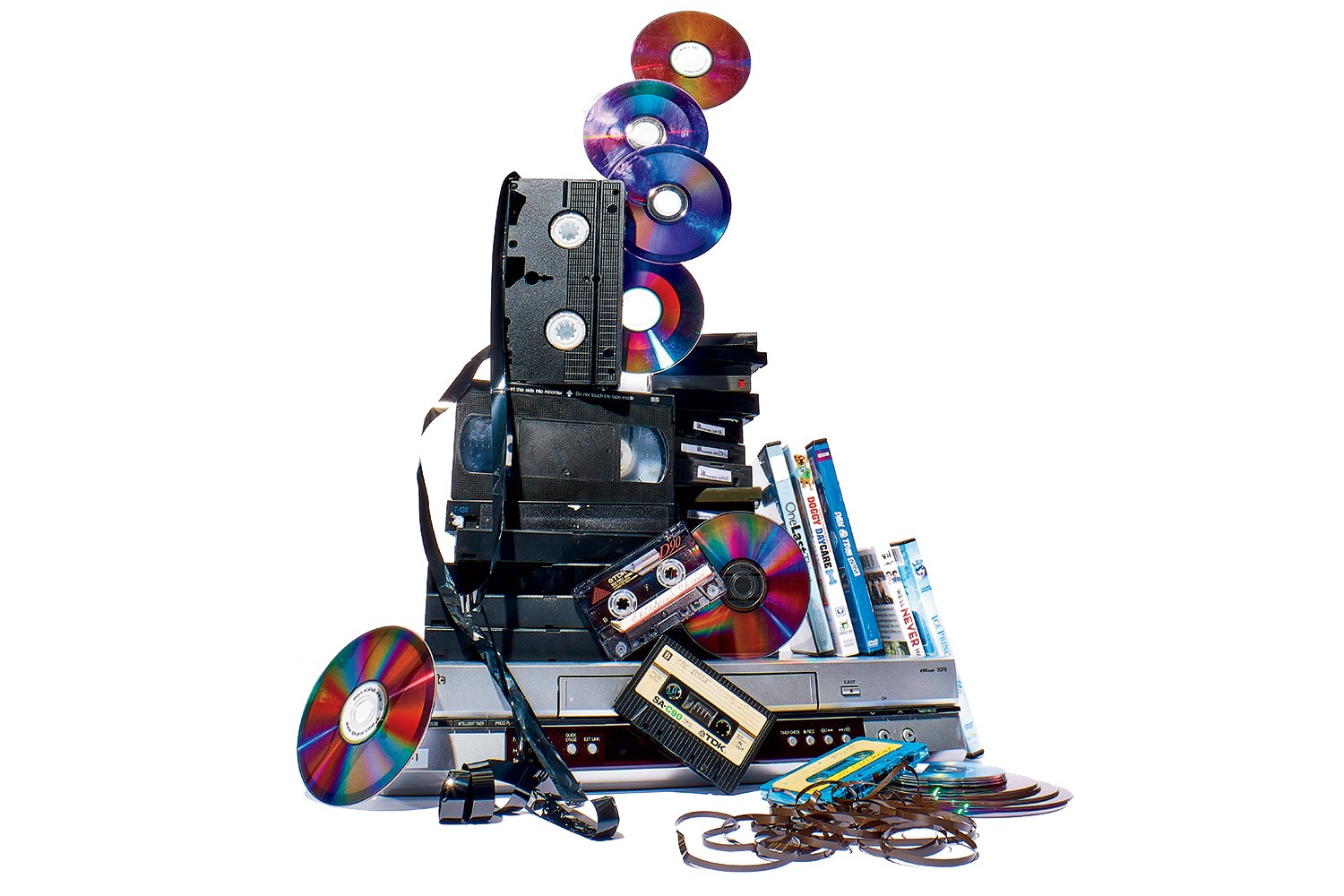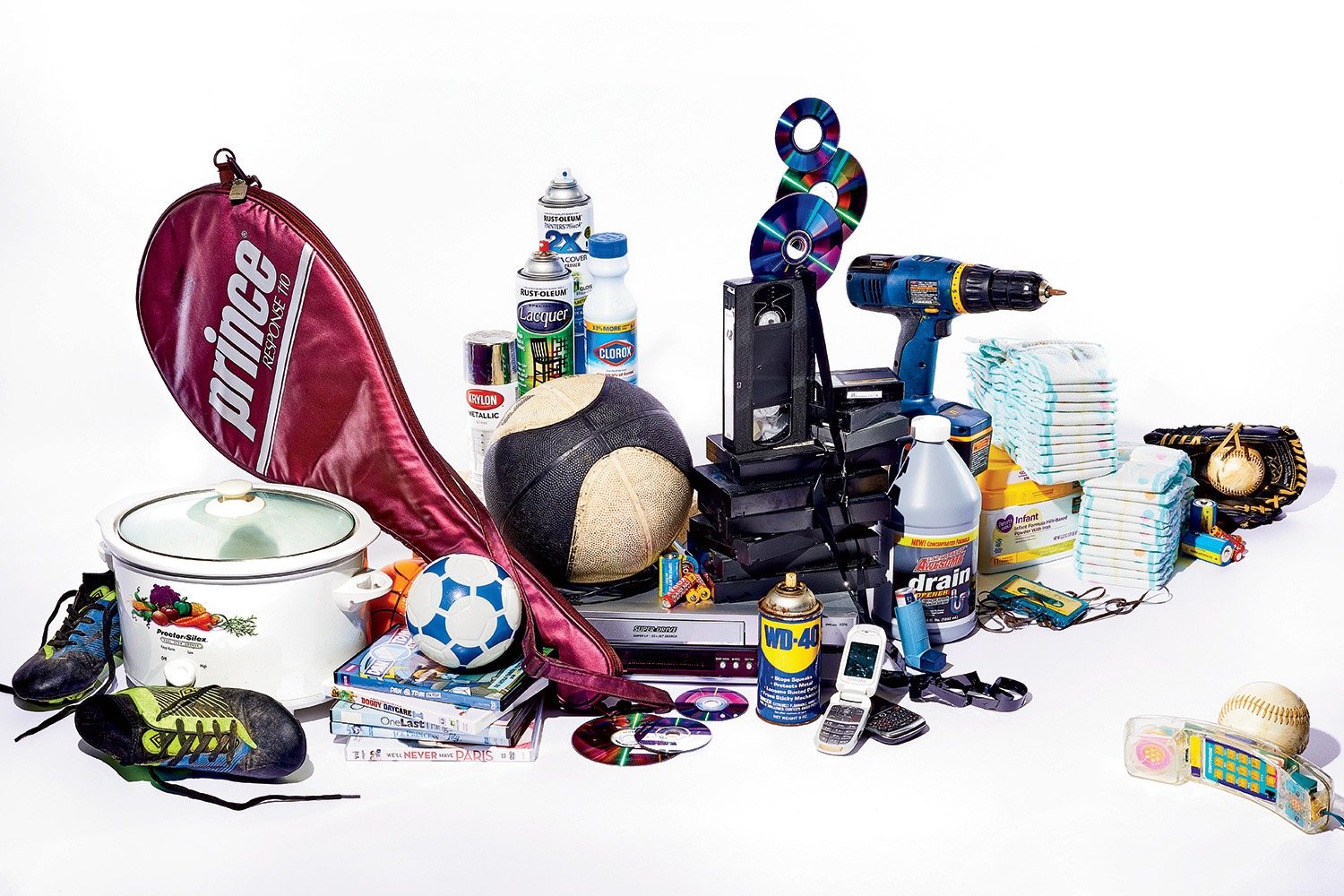The light at the end of the COVID tunnel is finally revealing itself, and I’m staging a rebirth in the desert to celebrate. It will be mystical. It will be magical. There will be light-bending crystals, a pulsating drum circle, clouds of palo santo incense, and a rainbow-licked fire that touches the stars. At sunset, I’ll run naked into the sandscape until I collapse, world-weary, under a grove of Joshua trees. And early the next morning, I’ll rise like the mother of all phoenixes, my pandemic-free future glittering before me with all the promise of a peyote trip.
Don’t. I. Wish.
In truth, I’m a 38-year-old with a husband, two kids, three pets, and more burden and responsibility than I’d care to acknowledge. And so I will settle, as I always do, for the basic mom equivalent: I will purge my home. Phase one, a room-by-room ousting and organizing, will get the house in order. The part I’ve been dreading is phase two, a mass expulsion of all the things I have no idea how to get rid of. But now that #COVIDlife is drawing to a close, it’s time. And I invite you to join me. The following list is a big one, but making our way through it will no doubt release thick gray clouds of anxiety from our subconsciousness like steam from a pressure cooker.
Are you ready? Let’s go.
APPLIANCES
I forgot to warn you that this list would not be sexy. Now that the cat’s out of the bag, let’s talk refrigerators! When a working appliance has overstayed its welcome, consider making a tax-deductible donation to one of the 10 Habitat for Humanity ReStore locations in the metro area — you can even schedule a free pickup. The staff will spiff up that old stove or washing machine before selling it, for a fraction of its original price, to someone who needs it. Every cent goes back into Habitat for Humanity Chicago. For the real clunkers — think rust-bucket water heaters, old furnaces, or any appliance that no longer works — Crusher Inc. in West Chicago will give you cash for the scrap. Just don’t expect much. Based on the quote we got (roughly five cents a pound), a 40-gallon water heater would fetch you … a whopping $6.

BABY STUFF
All post-potty-training parents have that extra half box of diapers staring them down from the closet. Send it to Share Our Spare, which also accepts breast pumps, Pack ’n Plays, baby clothes, small toys, and even wipes and diaper cream (unopened for those last two, please) and puts them in the hands of grateful Chicago-area mamas. In 2020 alone, it distributed 1.2 million diapers — which food stamps don’t cover — to tushes that needed them. You can use the residential pickup service or drop off the goods at its warehouse in Goose Island (935 W. Chestnut St.).
BIKES
Thanks to neighborly hand-me-downs, garage sale impulse buys, and random alley finds, my family of four has somehow accumulated 12 bicycles. Before you judge, know that eight of them are cruising over to Working Bikes, a local nonprofit that has distributed more than 100,000 refurbished two-wheelers in the Chicago area, Africa, and Latin America since 1999. It has drop-off spots around town (workingbikes.org for locations), including its shop in Little Village (2434 S. Western Ave.), and if you have more than five to offload [raises hand], it may be able to pick them up gratis.
CARS
Wheels on their way out typically fall into one of three categories: used cars with resale value, used classic cars with lots of resale value, and straight-up clunkers. I don’t have to walk you through the first, but if you’re ready to part with something special, talk to the pros at Chicago Car Club. The family-owned dealership specializes in facilitating deals for the whips you don’t see every day — the ’69 Camaros and ’57 Chevys of the world, say — and will either consign your car or buy it outright. For the junkers, head to Crusher Inc., which will give the current scrap value (think $200-ish for a car the size of a Honda Civic). One caveat: You’ll need to present the title; it’s required by law.
CELLPHONES AND TABLETS
Love animals? Still have your first Razr rattling around in a drawer? You’re in luck: Brookfield Zoo has partnered with Eco-Cell to kill two birds with one phone. Allow me to explain. Mobile devices contain coltan, a mineral found in Congolese Africa, and mining for it endangers both gorillas and their rainforest habitat. Helping prevent further mining, however, is as easy as tossing your old electronic gadget into a recycling bin at either of the zoo’s two entrances. From there, Eco-Cell will break it down and extract the coltan for use in a brand-new device.

SPORTING GOODS
If your garage is filled with more lacrosse sticks, softball cleats, and soccerballs than a Dick’s clearance aisle, it may be time for the Sports Shed. The local nonprofit partners with more than 230 organizations — including Chicago Public Schools — to ensure active kids have the equipment they need. Dropping off is easy; just tote your equipment (no clothing) to one of the five area Play It Again Sports stores they’ve partnered with (thesportsshed.org for locations).
FIREARMS
It doesn’t matter where you got it, why you have it, or even if you’re a resident of the city; if you have a piece (or 10) you’d like to get rid of, the Chicago Police Department will take it off your hands — no questions asked. Just bring what you have (unloaded, of course) to one of the city’s periodic firearm turn-in events, where bequeathing a BB gun will get you a $10 gift card and handing over the real thing puts $100 in your pocket. For information on upcoming events, call the CAPS Implementation Office at 312-745-5900.
FURNITURE AND MATTRESSES
Facebook Marketplace is probably the easiest place to sell a used dining table, but it’s not exactly heartwarming. At the warehouse run by the Chicago Furniture Bank in Lawndale, families transitioning from shelters to their own places can handpick an entire home’s worth of donated furnishings and other necessities. The nonprofit offers free pickup (though it does suggest at least a $100 donation), and it accepts mattresses — if you’ve ever tried to give one away, you know how hard that can be.
JEWELRY
Ready to turn that engagement ring from Mr. Wrong into cash? Four words: Mr. and Mrs. Digz. The Lake View boutique will either buy your unwanted sparkler outright or put it on consignment in the shop, where you’ll get between 50 and 60 percent of the sale price. The choice is yours.
MEDICATION
You can drop leftover prescriptions in collection boxes at pharmacies and police stations (click here for locations). But if you have surplus sealed doses of überpricey specialty drugs, consider driving a few extra miles to donate them. Though it isn’t yet legal in Illinois, many Wisconsin pharmacies participate in a repository program that distributes medications like insulin and Humira (which costs about $8,000 per injection) to the uninsured. One such chain, the family-owned Good Value, has locations just across the border, in Kenosha and Racine.
PIANOS
Just a few decades ago, the ivory-keyed instruments were status symbols in living rooms. But today they’re more likely to be masquerading as basement shelving units. Once you’re ready to offload, look no further than PianoForte Chicago in the South Loop, which has a foundation that provides pianos to public schools and community nonprofits. As long as yours is functional and less than 20 years old, it’s a great candidate for donation — the staff will even haul it away for you. If you’ve got something fancy like a baby grand, the store can help you consign or sell it instead.

VHS AND CASSETTE TAPES
Sure, you can toss those old Ace of Base tapes and Billy Blanks videos in the trash, but all that Mylar coiled up inside them — technically a hazardous material — will live on in a landfill forever. A better idea: Donate your old VHS and cassettes to Frugal Muse Books, Music & Movies in Darien, where your trash could be someone else’s treasure. (Psst: You can get money or trade-in credit for tech that’s only sorta obsolete, like CDs and DVDs.) Just be prepared to stay awhile; the place is a treasure-trove of deeply discounted entertainment media, new and old.
TOOLS
First of all, if this category applies to you, I am incredibly jealous. I received a pink tool set as a gag gift when I moved into my first place 17 years ago, and I’m ashamed to say I still use it. But I digress. If you’re ready to pare down your hardware collection, consider donating to the Chicago Tool Library, a volunteer-run organization that lends out tools and household equipment (think shop vacs, snow shovels, and slow cookers). Want to borrow something instead? Membership is open to Chicago residents over 18, and the suggested annual fee is $10 per $10,000 of income. Take that, pink tool set.
WORKWEAR
Tell Alexa to play some Queen, scrape your hair up into a bun, and open your closet — it’s time. I’m thisclose to saying there’s no better feeling than ticking this chore off the list, but donating your “no” pile to a worthy cause comes pretty darn close, especially if said cause is Bridge to Success. The nonprofit provides work-appropriate clothing and interview coaching to at-risk men, women, and young adults out of its Ukrainian Village boutique, where donations are accepted Tuesdays from 2 to 6 p.m. And just a reminder: If you wouldn’t wear it, buy it, or give it to a friend, you probably shouldn’t donate it.
ONE-STOP SCHLEPPING
A single spot where you can dispose of the rest of the stuff you have no idea what to do with? It’s true: The Household Chemicals & Computer Recycling Facility in Goose Island is a purger’s dream. That old drain cleaner you have lying around? They want it. The CFL bulbs you know you’re not supposed to trash? They need them. The antifreeze, paint stripper, and lawn pesticide you dragged out of the garage? They practically crave them. The list of stuff accepted runs the gamut from bleach and motor oil to scanners and video game consoles, with lots of aerosol cans, batteries, and chemicals in between. (Pyros and paint huffers should note that they do not accept fireworks, explosives, or latex paint.) For a full rundown plus drop-off hours — Tuesdays, Thursday, and some Saturdays — visit chicago.gov/hccrf.




Comments are closed.